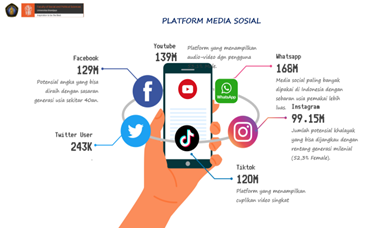Literasi Media Digital bagi Gen-Z di MAN 1 Kota Malang Digital Media Literacy for Gen-Z in Islamic Elementary School 1 Malang City
Main Article Content
Abstract
The behavior of Indonesian netizens is considered the most disrespectful in Southeast Asia, and most netizens in Indonesia are dominated by Gen-Z, who have the highest internet addiction rates. This Community Service Program focuses on digital media literacy for Gen-Z in Malang City. We conducted this program using a participatory method at MAN 1 Malang City with several approaches: a digital media literacy seminar for Gen-Z and an interactive discussion on the use of digital media with Gen-Z. The results of this community service program provide awareness on the use of digital media for Gen-Z students in MAN 1 Malang, regarding: The principles of communication in the use of social media, the Consequences of using digital media on personal data and social interactions, and Production of educational content through digital media. The interactive discussion process shows an imbalance between knowledge and practice of using social media, such as Gen-Z has not yet understood the bad consequences of using social media. However, it has become a user of social media. Another thing, Gen-Z has understood the age limit of social media use, but they are fighting it on the grounds of seeking information and entertainment. Through this community service program, we provide digital literacy model designs to MAN 1 Malang City to demonstrate to Gen-Z students.
Downloads
Article Details

This work is licensed under a Creative Commons Attribution-ShareAlike 4.0 International License.
Authors who publish with this journal agree to the following terms:
- Any article on the copyright is retained by the author(s).
- Author grant the journal, right of first publication with the work simultaneously licensed under a Creative Commons Attribution License that allows others to share work with acknowledgment of the work authors and initial publications in this journal.
- Authors are able to enter into a separate, additional contractual arrangements for non-exclusive distribution of published articles of work (eg, post-institutional repository) or publish it in a book, with acknowledgment of its initial publication in this journal.
- Authors are permitted and encouraged to post their work online (e.g., in institutional repositories or on their websites) prior to and during the submission process, as can lead to productive exchanges, as well as earlier and greater citation of published work.
- The article and any associated published material is distributed under the Creative Commons Attribution-ShareAlike 4.0 International License
References
Annur, C. M. (2022). Survei: Pecandu Internet Terbanyak dari Kalangan Gen Z. https://databoks.katadata.co.id/datapublish/2022/06/29/survei-pecandu-internet-terbanyak-dari-kalangan-gen-z
Bawden, D. (2008). Origins and Concept of Digital Literacy. In Lanksher, C. & Knobel, M. (Eds.), Digital Literacies: Concept, Policies, and Practice. Bristol: Peter Lang.
Digital Civility Index. (2020). Civility, Safety, and Interactions Online – 2020. https://news.microsoft.com/wp-content/uploads/prod/sites/421/2020/02/Digital-Civility-2020-Global-Report.pdf
Dihandiska, A. V, Nugroho, R. A., & Santoso, T. B. (2021). Hoax Terkait COVID-19 di Indonesia: Sebuah Literasi untuk Memperkuat Kemitraan Pemerintah Terbuka. Spirit Publik, 16(1), 57–69. https://doi.org/10.20961/sp.v16i1.45883
Hakim, S. N., Raj, A. A., & Prastiwi, D. F. C. (2017). Remaja dan Internet. Prosiding SEMNAS Penguatan Individu Di Era Revolusi Informasi. 311–319.
Hartik, A. (2020). Dihina karena Kalah Main Game Online, Remaja Ini Bunuh Rekan Kerjanya. https://regional.kompas.com/read/2020/09/09/20065321/dihina-karena-kalah-main-game-online-remaja-ini-bunuh-rekan-kerjanya
Hussin, M. H., Muhammad, A., & Larasathy, G. (2022). Penguatan Literasi Digital dalam Merespons Peningkatan Ekonomi Digital pada Masa Pandemi COVID-19. JPPM (Jurnal Pengabdian dan Pemberdayaan Masyarakat), 6(2), 349-356. https://doi.org/10.30595/jppm.v6i2.12488
Juditha, C. (2019). Buzzer di Media Sosial Pada Pilkada dan Pemilu Indonesia. Prosiding Seminar Nasional Komunikasi dan Informatika, 3, 199–212.
Majid, N. W. A., Fauzi, A., Sari, D. P., Ridwan, T., Widodo, S., Meyriska, N., et al. (2022). Pengembangan Keterampilan Digital Content Creator Pelajar Tingkat Menegah Atas di Kabupaten Purwakarta. JPPM (Jurnal Pengabdian dan Pemberdayaan Masyarakat), 5(2), 283-291. https://doi.org/10.30595/jppm.v5i2.9898
Mustika, R. (2019). Pergeseran Peran Buzzer ke Dunia Politik di Media Sosial. Diakom : Jurnal Media dan Komunikasi, 2(2), 144–151. https://doi.org/10.17933/diakom.v2i2.60
Nurjanah, A. & Mutiarin, D. (2020). Pemberdayaan Cabang Aisyiyah Ngampilan Yogyakarta melalui Literasi “Media Sehat”. PengabdianMu: Jurnal Ilmiah Pengabdian Kepada Masyarakat, 6(1), 65–71. https://doi.org/10.33084/pengabdianmu.v6i1.1445
Rahayu, A. (2022). Meningkatkan School Well-Being di Era Digital (Pengabdian Masyarakat di SMA Muhammadiyah 1 Jakarta). PengabdianMu: Jurnal Ilmiah Pengabdian Kepada Masyarakat, 7(3), 432–437. https://doi.org/10.33084/pengabdianmu.v7i3.2816
Rastati, R. (2018). Media Literasi Bagi Digital Natives: Perspektif Generasi Z di Jakarta. Kwangsan: Jurnal Teknologi Pendidikan, 6(1), 60-73. https://doi.org/10.31800/jtp.kw.v6n1.p60--73
Sugiono, S. (2020). Fenomena Industri Buzzer di Indonesia: Sebuah Kajian Ekonomi Politik Media. Communicatus: Jurnal Ilmu Komunikasi, 4(1), 47–66. https://doi.org/10.15575/cjik.v4i1.7250
Surji. (2015). Pengaruh Internet Terhadap Kehidupan RemajaDi Kota Padangsidimpuan. Indonesian Journal on Networking and Security, 4(4), 1–8. http://dx.doi.org/10.55181/ijns.v4i4.1361
Syukri, M., Sujoko, A., & Safitri, R. (2019). Gerakan Dan Pendidikan Literasi Media Kritis Di Indonesia (Studi terhadap Yayasan Pengembangan Media Anak). Mediakom : Jurnal Ilmu Komunikasi, 2(2), 111–134. https://doi.org/10.32528/mdk.v2i2.1925
